Learning about the Positive Parenting approach has been an amazing gift for me and my family. But it has not always been an easy path.
Since my husband and I started using positive techniques instead of punishment with our son, we have received many comments that show a frustratingly common misunderstanding of it.
I’ve been openly criticized, questioned, condescended to, and mocked for our choices and frankly I’m tired of it!
Today I am sharing ten misconceptions and the best comebacks you can use to defend positive parenting!
This post includes Amazon Affiliate links. Please see our Disclosure for more details.
Although its popularity is spreading, positive parenting is still not the most widely accepted parenting style in North America, where time-outs are are still viewed as a relatively harmless alternative to spanking.
It takes a thick-skin to remain positively steadfast (please forgive the pun!) when it comes to the use of punishment (or more correctly – the non-use of it), when advice from family members, friends, and strangers even – may judge us (incorrectly!) as being overly permissive, indulgent, or just downright wrong.
“Newfangled baloney” is how one FB reader recently described my post on 10 Ways to Discipline Without Controlling Our Kids which I thought was a fairly uncontroversial overview of positive parenting practices.
I’ve also had someone sarcastically comment in surprise that he didn’t think we actually said “No” to our son.
And I know my own parents have struggled with understanding our choices – because it is so different from how they were brought up, but….
10 COMEBACKS to DEFEND Positive Parenting
Misconception #1:We don’t say “No.”
COMEBACK: We have clear limits and expectations for behaviour that are communicated and TAUGHT regularly to our children through our words, our own actions, and through the use of natural and logical CONSEQUENCES.
(And we do say “No” to our kids, but use it sparingly, in favour of telling our children how we would like them to behave.)
Just because we choose to use “No” wisely, does not mean we don’t say it. We just choose to save it for when our kids really need to hear it.
It does not shoot out of our mouths in every other sentence, because we’ve learned that it doesn’t need to. You can catch more flies with honey, right?
We have also learned that the more you use it, the less effective it becomes…
To learn more about how limits can be set in a positive way, read 5 Secrets of Fair Parents.
Misconception #2: Our kids will grow up to be undisciplined and unruly because we don’t use negative consequences for poor behaviour choices.
COMEBACK: Much of our parenting focuses on teaching our children to respect themselves AND others, and to control their own behaviour – so that when we’re not around – they’ll still make good choices.
We acknowledge that punishment can be effective for some children in stopping certain behaviours, however, we also understand there are many downsides to using it.
Read 14 Reasons Why Time-Outs Might Not Be Working for a detailed overview.
The bottom line, regardless of any pro-punishment argument, is that the use of punishment with your children gains cooperation out of fear (either of you – or of the negative consequences you apply), and it damages the parent-child bond.
Oh yeah, and it also only works if you are present.
Positive parents want their kids to behave because they know that it’s the RIGHT thing to do, or the CONSIDERATE thing to do.
This involves guiding our children to develop higher moral thinking skills, as well as empathy for others, and self-regulation.
We also know that although it may take a long time for our kids to learn these lessons, they are some of the most important lessons they can learn in life and they are worth every extra second, minute, hour and day we spend on teaching them.
With each discussion instead of spanking, with each time-in instead of time-out, and for every natural consequence instead of withdrawal of privileges – we communicate that we value these important life lessons.
Misconception #3: We are not preparing our kids for the “real world” by not being strict or harsh.
COMEBACK: We are bringing up our children in a secure and nurturing, home where rules are fair and flexible. Research shows that this parenting style will help them to grow into resilient adults who deal effectively with adversity in the “real world.”
Positive parents recognize that the world and “real life” can be harsh and filled with disappointments and unfairness.
We seek to create a home and relationships that will act as a buffer to our child’s life stresses.
Research clearly shows that many of the characteristics of a positive parenting approach act as resilience promoting elements, such as:
- having “a strong, positive emotional attachment to a caring, loving adult throughout childhood”
- living in a family where “all members talk to each other about their feelings and concerns and about what’s happening in their lives”
- having parents who are “warm, nurturing, and loving”
- having parents who “comfort children when they’re upset“
- having parents who provide “firm, clearly defined rules and the reasons for the rules, while being flexible“
- having parents who “use reason and persuasion” to guide their children
(Source: “Growing Up Resilient: Ways to Build Resilience in Children and Youth,” Centre for Addiction and Mental Health, 2007)
Misconception #4: We must have all the TIME in the world to use these techniques (usually said sarcastically).
COMEBACK: The time we spend proactively teaching positive behaviour, and the time we take problem-solving after challenging behaviour occurs, is similar to what would otherwise be spent on doling out and enforcing negative consequences.
If the skills and strategies of the positive parenting approach are completely foreign to you, then yes, it can take some time to begin to learn how to parent in this “new” way.
However, once you have learned some of the basic techniques and the reasons behind the approach, challenging behaviours start to become much less frequent.
Frequent power struggles become a thing of the past. Lengthy temper tantrums diminish. And the time with our children becomes much more positive.
In short, the initial time investment, and the time it takes to problem-solve and discuss issues with children, is worth it! And can be done by any parent, no matter how busy.
Misconception #5: We must have incredible amounts of unending patience, or are just plain “perfect parents.”
COMEBACK: We are not perfect. We are engaged and committed to continuously improving our relationships with our children, and to improving our skills as a parent.
In a recent FB page conversation, a woman expressed the thought that the positive parenting approach was clearly only for “stay-at-home-moms” or “parents with only one child.”
Being one such mother, I was simultaneously angered and frustrated because I felt somewhat unqualified to rebut the argument.
But, when I thought more about this woman’s underlying feeling – I realized that it was one of misunderstanding and fear.
Somehow she had equated being a positive parent with being “perfect.” You know – someone who never loses their temper, or who never makes mistakes (Do those really exist?)
And so, to her, being a “positive parent” became an unattainable (and perhaps undesirable) goal.
However, in reality – positive parents are not perfect parents. (If most are anything like me at all – far from it!)
But, we are open.
Open to learning more, open to examining our strengths and weaknesses, and open to improving our relationships with our children – always.
Misconception #6: We SPOIL our kids with attention – and they will become self-centered adults who think the world revolves around them.
COMEBACK: We value the power of connection with our children. We recognize that the MORE connected we are, the more our children will benefit from what we have to teach them (and the happier we will all be!).
We understand that children need to feel loved, heard, understood by, and connected to their families to thrive emotionally.
Research shows that the more securely attached kids are to their parents (or primary caregivers), the more likely it is that they will develop a secure sense of self as adults.
Connected and secure kids grow into adults who are able to focus more on others, reach out, empathize, and connect easily.
Conversely, when we deprive our kids of the attention and connection they crave, or are inconsistent in giving it, they are at risk of becoming insecure adults.
These adults tend to be either anxious, clingy, and preoccupied with getting their own unfulfilled needs met (translation: desperate for love and/or approval), or dismissive of, and disconnected from, intimacy altogether.
Point made.
(Source: Dan Siegel, author of Parenting from the Inside Out: How a Deeper Self-Understanding Can Help You Raise Children Who Thrive and multiple other positive parenting books!).
Misconception #7: We give our kids too much power.
COMEBACK: We recognize that all individuals flourish when they have some level of control and power over their own lives, including children – and this is a healthy need.
This is why putting someone in prison is such a painful punishment – because the system takes away all personal control. (And we all know that that system works really well doesn’t it?)
“But kids have to know we’re in control in order to feel secure, don’t they?”
Well, yes – kids need to know they can depend on us for guidance and appropriate limits.
But the more age-appropriate power and control we hand over to our kids (and the younger we start, the better, according to Barbara Coloroso), the more practise they get at making decisions for themselves and experiencing the results of their choices.
This is how self-regulation begins. Making decisions for themselves boosts kids’ sense of self-efficacy and mastery of their environment, and helps to build resilience.
(Source: Reaching In, Reaching Out Teacher Training, based on research done at Penn State University on resilience).
Misconception #8: We are raising “sissies, wimps and over-emotional kids.”
COMEBACK: We know that the more we support the healthy expression of emotion, the better able our children will become at regulating their own emotions in the future.
Because positive parents valueand respect our children’s emotional experience, we allow our boys to cry (and our girls of course too!), we comfort and empathize when our children are upset, and we allow our kids to feel angry (even with us!).
Oftentimes, the people who believe that allowing kids to openly express feelings is a bad thing, struggle with emotional regulation themselves.
They have usually been taught that the expression of certain uncomfortable emotions is not acceptable (e.g. Boys don’t cry, Good girls do not express anger.)
Sometimes they fear that if they allow their kids to really own their emotions and to express them (in healthy ways), the emotions will overwhelm the children and come to control the child.
However, this couldn’t be farther from the truth.
The more kids are taught to identify different feelings, recognize when they are experiencing them, and learn to express and release them in healthy ways (especially feelings of sadness and anger), the more they become capable of healthy emotional self-regulation as they mature.
(Source: Reaching In, Reaching Out Teacher Training, based on research done at Penn State University on resilience).
Read more about how positive parents can support kids when they’re upset here: Cruising Towards Mellow: A Roadmap for Supporting Upset Kids
Misconception #9: Because we don’t insist on obedience, our kids will grow up to be disrespectful to all authority figures.
COMEBACK: As parents, we act as leaders in our family. We recognize that our children are our social equals who deserve as much respect as we do – and we feel it is disrespectful to try to control them.
Our approach is encouraging our children to grow into confident adults who will not fear authority, and who are capable of speaking their truth.
I think this misconception often comes down to people’s notion that society cannot function without some level of obedience and respect. And I completely agree.
But I often hear the example that, “As adults we need to obey our bosses and other authority figures like the police” – being used as a justification for parenting in a way that encourages kids to blindly obey.
The problem with teaching our kids this lesson, is that there are always going to be people that abuse their positions of power.
I’d rather my child have the confidence and the inner strength to stand up to an authority figure who is abusing their power, than be one of the many who follows the crowd and keeps their head down out of fear.
Misconception #10: We allow our kids to “talk back.”
COMEBACK: We talk a lot with our kids and allow them to express their ideas and opinions – even if they differ from, or challenge (gasp!) our own beliefs because we strive to treat them the way that we would want to be treated.
We teach them they always have the right to respectfully express their thoughts, opinions, and feelings (even if that means that they question our rules or limits).
We problem solve together, we compromise with each other, and we strive to be flexible and open leaders – willing to take constructive feedback.
In the process, we also teach them that regardless of their age, no one has the right to hurt them, to steal from them, or to degrade them – and that it’s okay to speak up for themselves when and if these things happen.
We work hard on these skills with the hopes that our children will develop the confidence to trust their instincts and believe that they are valuable, contributing members of a society where their voice can make a difference.
That brings us to the end of the 10 most frustratingly common misconceptions about positive parenting.
Maybe the next time someone makes an unenlightened comment on my parenting choices, I will just close my mouth, and direct them to this page! It is definitely MY truth.
I hope you enjoyed reading my mini-vent today and maybe even got some words to defend positive parenting choices of yours too!
Would you like to read more posts like this one? Why not join over 1500+ other parents and subscribe to our newsletter! Add your e-mail to the box below.
Follow One Time Through’s board Positive Parenting on Pinterest.
I love hearing your thoughts and ideas! Leave a comment below.
Wishing you all the best in your parenting journey,
Pin me Please!
Today’s post is part of our Positive Parenting: An Alphabetic Series. This week’s topic was T is for Thick-Skin (I know – it was a wee bit of a stretch this week! LOL).
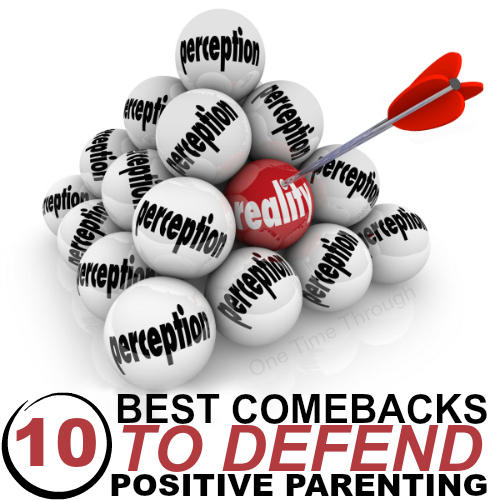
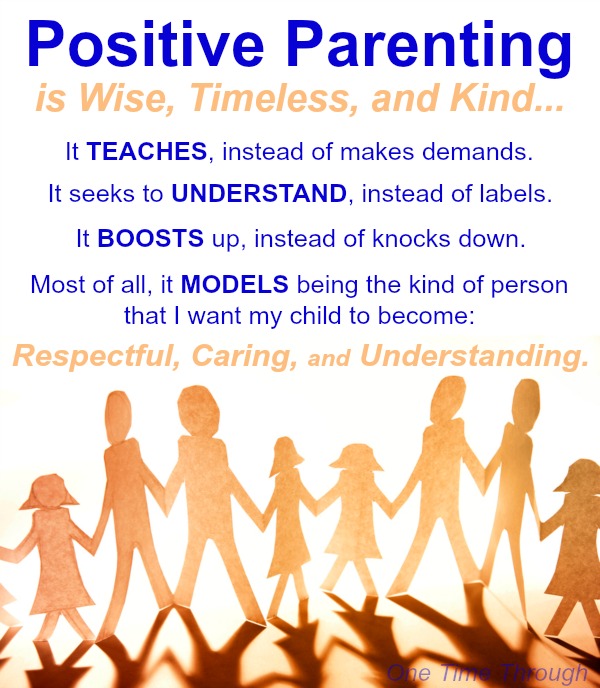
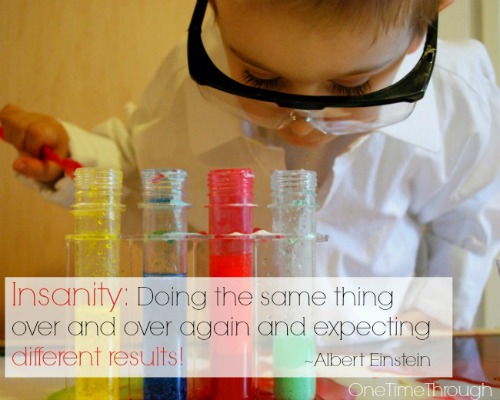


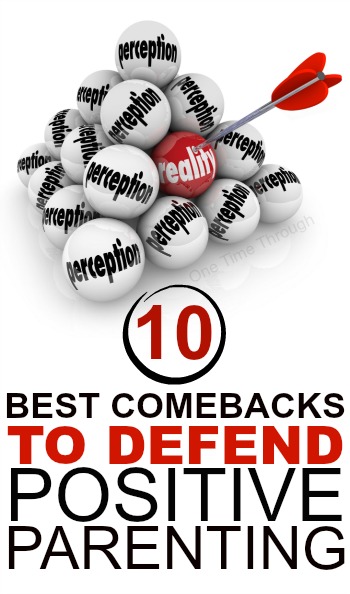
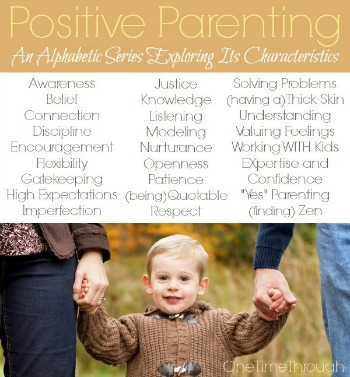
Hey Suelively, Just wanted to say bravo for what you wrote, defending your choices to parent the way you feel you should. There are many ways to parent but you do what works for you, no matter what anyone says to you or behind your back. Usually when people make un-called-for-comments, its because they don’t understand, or they are ignorant to the different ways things can be done, not always is their way the right way. I have run into many different people over the years with many different ways of parenting their children, and I find I just need to treat the kids the way I would want to be treated, and teaching them to have ‘thick-skin’ sucks but I think it helps them to realize that their choices in life have to feel right for them, not for other people. Please themselves, and not worry what other people think. Follow examples that feel right to them, not just because its what they see demonstrated. Its a toughy but if they understand this, then my hope is that they will be strong individuals who make the right choices for themselves.
Good ‘venting’…well said!! 🙂
Thanks so much for dropping by Christine! xx I love what you said about teaching our kids to have a tough-skin. You have a different slant on it – but that’s how I see things too. It’s something I’ve struggled with – not needing/seeking approval from others, and to trust my gut – and I want that for my son. So important to our kids’ eventual happiness though I think. Thanks again for the feedback!